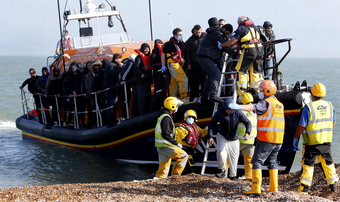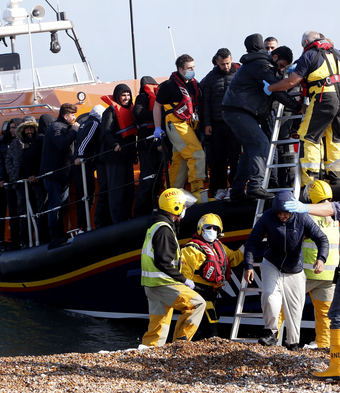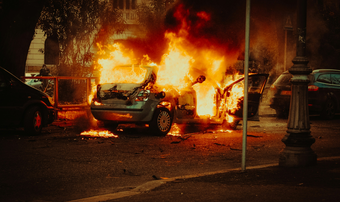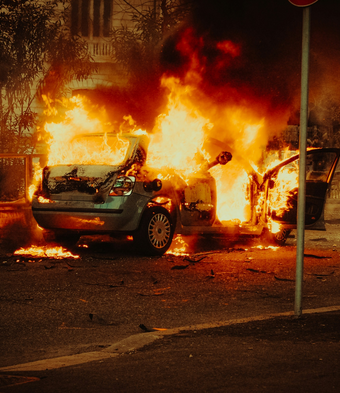The doomsters are winning. We must be different.
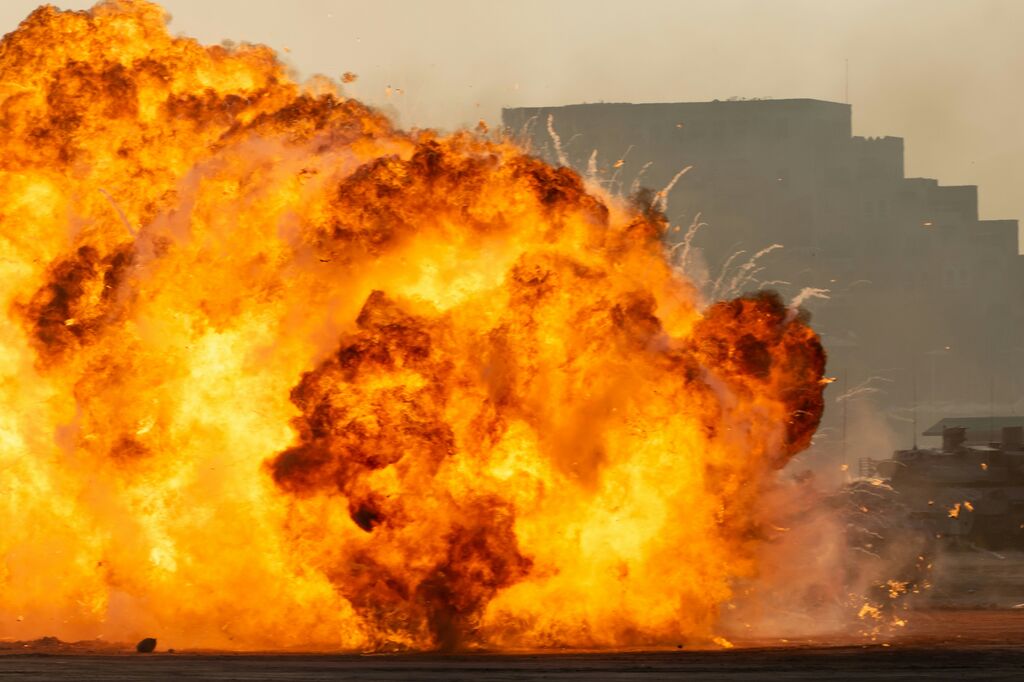
The doomsters seem to be winning. If the world is split into two types of people, as we commonly like to joke, then it’s those who see their glass as half empty who seem to be in line with the signs of the times.
You need not look far to find the latest hot take from those that believe the world is going to hell in a hand cart. And for all that those who see the glass as half full may want to push back, do the doomsters not have a point?
This week further disorder and hostility broke out on the world stage as the Israel-Iran conflict bubbled over into a direct confrontation after years of hurting one another through proxies and covert operatives. On the 13th April Iran launched some 300 rockets and drones at Israel in response for an earlier Israeli attack on its consulate in Syria which one of Iran’s leading Islamic Revolutionary Guard Generals was killed.
Last night, Israel then responded in attacking Iran directly, if in a somewhat more limited form. Both nations have significant weapons at their disposal and the fallout from the escalation of their conflict would signal yet another devastating nail being driven into the coffin of world peace. The risk of further regional instability and bloodshed as well as the potential for nuclear war is all too real.
Understandably, several world leaders have and will continue to urge restraint from both sides, including our own Foreign Secretary, David Cameron. Though the Israel-Iran conflict has spilled out into the open, Israel’s military strike on Iran was somewhat muted and Iran itself appears keen to play down the significance of the retaliation. And even though Israel felt the need to strike back, Israeli defences and allies prevented far less damage and destruction than one might imagine from such a barrage of weapons in Iran’s attack.
Some international commentators are thus portraying the conflict as an exercise in optics and messaging, a case of both sides feeling compelled to make their point. And whilst there is the obvious possibility that historians of this period will look back on these events and draw different conclusions, there is a sense that the world is on an increasingly slippery slope towards war.
It is as if we are gripped by angst and confusion, death, and decay. As I have written about before, our assumptions about the world order, and even our domestic affairs, are being challenged. How are we to make sense of international conflict? How are we to respond?
Liberalism or Realism?
Well, there are two main streams of ideological thinking in the world of international relations. One known as liberalism, which can crudely be characterised as the glass half full option, and the other known as realism, which might be recognised as the glass half empty option.
Liberalism at a very basic level believes that international cooperation is possible, and that war is not an inevitable endpoint of human affairs. By building international institutions, like the United Nations (UN), or the International Monetary Fund (IMF) that foster dialogue, trade, and cooperation, relationships can be built up and conflict avoided. Individual states then ought to respond by engaging with an international community towards the shared end of interdependence and communication to ensure peace and prosperity for all.
Realism instead takes the more pessimistic stance that human conflict and aggression is an inevitability, and we ought to be realistic about that truth (hence the name). As a result, states need to (and/or will as a matter of fact) act in their own naked self-interest to ensure their own security and needs are met. This doesn’t necessarily eliminate the option of international cooperation, but it does ground that cooperation in a fundamentally different motivation and logic. Individual states then ought to respond by preparing themselves for the inevitability of conflict by ensuring their defence forces are well trained and resourced, international affairs are manipulated towards their ends, and alliances are built around their own interests.
You hear this ideology in the calls for the UK to increase its defence spending, for example, or even that we might need to consider conscription at some point.
Although a mix of these ideas have permeated international affairs in recent decades (the world is rarely clear cut after all), but it is fair to say that liberal thinking has been the more dominant of the two. But now, just as your average Joe seems to be being won over to the doomsters’ (glass half empty) perspective, so too the international community to the doctrine of realism.
Military alliances like AUKUS have been created. Defence spending increased. And military aid cheques signed. Yet at the same time, whilst realist doctrine might encourage one’s state to prepare for war it doesn’t necessarily glorify conflict. In fact, realist doctrine can necessitate the withdrawal of support for nations/causes if they should imperil your own safety and security.
Aspects of this are seen in Biden’s caution in supporting Israel, fearing large-scale regional (and perhaps international) war, and the inevitable implications this would have for America which would likely get drawn in to support its long-term ally. Similarly, Republican reluctance to countenance sending further military support to Ukraine rests, at least in part, on the presupposition ‘what’s in it for us?’ After all, it isn’t immediately apparent how sending billions of military equipment and aid to eastern Europe is in America’s best interest.
And as the world appears to be increasingly unstable, realism looks set to govern our political thinking for the foreseeable. There is perhaps some sense in this, after all as Christians we know the world to be a fallen place, the human heart to be corrupted, and the very real and very destructive consequences of evil to be true this side of the new creation.
In this light, we should not be surprised at animosity between nations, at hostile actors who sow violence and death, at tensions over scare resources or identities or cultures. Jesus himself characterised the last days as involving “wars and rumours of wars” before the end (Matthew 24:6).
There is a great wisdom then in being prepared to deal with conflict by maintaining a well-prepared and resourced army knowing they may one day be necessary to defend your nation.
There is an astuteness to recognising international instability may threaten supplies and trading of key resources and working to mitigate such an outcome.
There is merit to building common alliances knowing that your defence may be more secure with numbers on your side.
And there is value in recognising that some actors are to be treated with caution.
Realism therefore can be a helpful counterbalance to the naïve utopianism of a cloudy eyed liberalism. Yet whilst realism might provide a helpful perspective on the state of global affairs, its logic can quickly lead to a violent dystopian nightmare in which the strongman is king.
Christianity points to an alternative
Whilst the world needs a mix of cynics and dreamers, an overwhelming swing to one or the other can lead us trapped in despair or blinded by unrealistic ambition. The Bible’s antidote to crushed dreams or fear inducing occurrences is not to give up on hope, but to re-direct it.
“No king is saved by the size of his army;
no warrior escapes by his great strength.
A horse is a vain hope for deliverance;
despite all its great strength it cannot save.”
Psalm 33:16-17
Faced with the threat of war and the decline of international cooperation and institutions, one is neither to turn to despair, nor to faith in one’s armed forces. We shouldn’t be naïve, about the state of the world, but we shouldn’t join in with the doomsters. Rather the pages of Scripture are awash with calls to put your hope in the Lord.
“But the eyes of the Lord are on those who fear him,
on those whose hope is in his unfailing love,
to deliver them from death
and keep them alive in famine.
We wait in hope for the Lord;
he is our help and our shield.
In him our hearts rejoice,
for we trust in his holy name.
May your unfailing love be with us, Lord,
even as we put our hope in you.”
Psalm 33:18-22.
Realism gives little scope for hope. Of course, if yours is the strongest army, the biggest navy, or the most accomplished air force, realism’s emphasis on self-reliance and self-interest may leave you feeling more confident than your next-door neighbour, but that is hardly an optimistic outlook. Rather, international affairs are conducted through the prism of fear and mistrust in which the most powerful exert their power and influence for their own ends.
Instead, believers should not give up hope, nor stop working for peace, cooperation, and mutual understanding at the international level. For all that international institutions are broken and flawed like any other, there is something good about a project which dreams of a better world where disagreements are conducted through dialogue rather than at the sharp end of the sword.
Besides, institutions, laws, treaties, and trade deals can all be improved and there is surely place for a healthy ambition to use one’s economic influence, legal skill, and diplomatic talent to negotiate the international arena. Realism perhaps offers us balance against expecting too much but it cannot be right to settle for expecting too little.
International relations viewed through the realist prism also falls short in that it offers limited moral guide rails beyond self-preservation. One might could make a compelling argument that this is indeed a good end and little more is possible, but it says little else in the way of morality or justice.
Of course, part of the reaction against liberal international doctrine is due to the failure of the liberal powers and institutions to achieve the justice and morality that they held to motivate their international efforts (be that in Libya, Iraq, Afghanistan to name just a few), yet to abandon any hope for moral or just ends in the international sphere ought not to sit right.
Psalm 33 verse 5 tells us that “the Lord loves righteousness and justice”, Isaiah 1calls on the people of God to “learn to do right; seek justice. Defend the oppressed.” Every aspect of our politics then ought to have a concern after the heart of God. To relegate international affairs to the realm of the amoral is to show a lack of regard for the vulnerable and a lack of concern for our world.
In this doomster culture with realist thought gaining traction, it is not inconceivable that with our limited resources and the vast extent of threat and injustice visible on the global stage we simply turn our backs, shut-up shop, and close our eyes and ears to the pain and discomfort of the oppressed and needy. That might make sense according to self-interest, but that surely can’t be right given the presence of good and evil in the world.
This is not to say however, that we should rush back to the heady mix of utopianism and overconfidence that saw Western nations seek to establish western-style democracy and human rights at the point of the sword only to fail in that task and do great damage in the process.
We do need some of realism’s hard truths about the scope of what can and cannot be achieved, and what actually works, rather than pursuing good ends at great harm and cost only to make a bad situation even worse. Yet, we need some of liberalism’s ambition for justice and peace that doesn’t cause us to turn a blind eye to some of the worst excesses and neglects humankind is capable of.
In every generation, violent international circumstances have a tendency to push us towards the extremes, adopting either doomster fear and self-protectionism or hopeful but perhaps misguided idealism.
Ecclesiastes tells us that “there is nothing new under the sun” and obviously this is not the first time that believers have looked out upon a world characterised by violence and bloodshed with fear and trembling. They have sought to make sense of this, most notably through the development of Just War Theory (perhaps a far healthier framework for international relations).
Historically, believers have resisted dystopian and utopian extremes by holding together the mix of fear that we know to be this life’s tragic reality, and the hope that we know to be the coming life’s glorious redemption, and the prospect of its first fruits here and now. Let us stand in their footsteps clear eyed about the tragedy and commonplace of war, and hopeful and passionate about the need for, and possibility of, justice.

